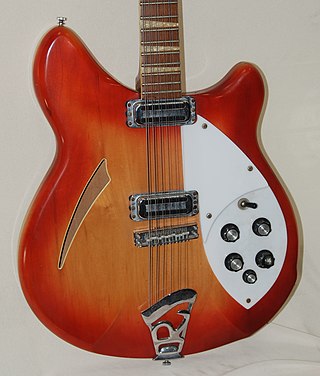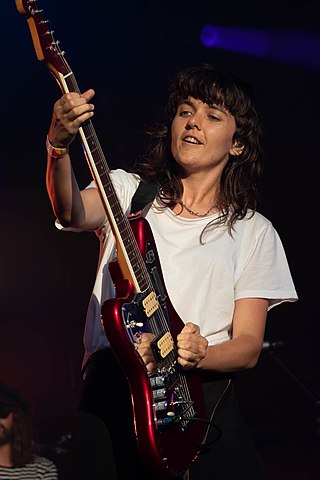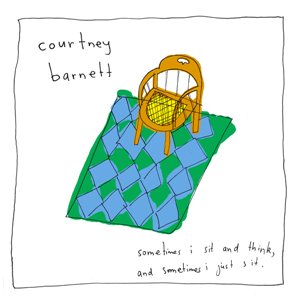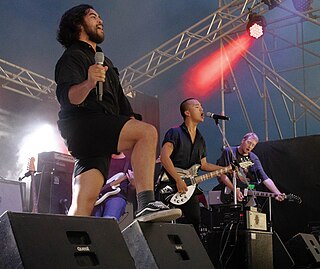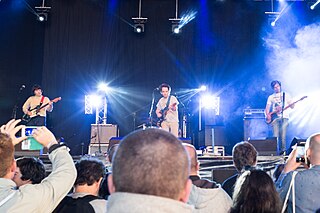Etymology and history
The term "dolewave" derives from "the dole", an Australian English [6] term for an unemployment benefit that "supposedly supports artists' creative lifestyles". [7] It was first used in 2012 as an "ironic in-joke" on Mess+Noise , a now-defunct Australian music website. [8] That year, one of the site's journalists, Doug Wallen, coined the term "New Melbourne Jangle" to describe a range of jangly indie pop bands from Melbourne—among them Twerps, Dick Diver and Scott & Charlene's Wedding—which wrote songs about outsider youth and contemporary life in urban Australia. In response to Wallen's article, anonymous users of the site's message board came up with various tongue-in-cheek alternative labels, including "chillmate", "sharehouse-pop", and "dolewave", the last of which quickly eclipsed the others in popularity. "Once uttered, dolewave repeated like a meme, equal parts in-joke, insult and hash-tag shorthand," writes music journalist Shaun Prescott. [2] Over the next year, musicians associated with the term engaged with it ironically, such as Dick Diver's lead singer, who called dolewave "a good gag" before vowing to destroy it. [1] The term is said to have stuck because it "epitomised the downtrodden, affectless vocals and slack riffs and rhythms which dominated whatever was happening in the spotlit Australian underground." [9]
"Dolewave" remained in "jokey usage" until 2014, when music critics and mainstream publications such as The Guardian and The Sydney Morning Herald began examining it in-depth. [8] Everett True cited fellow music critic Shaun Prescott's review of School of Radiant Living's 2013 self-titled LP as a turning point for dolewave, one where the "tossed-off phrase" became a legitimate genre once he "[sorted] out in his own head as to what the word actually represented". [1] Prescott praises the title track of Dick Diver's 2011 debut album New Start Again as a quintessential dolewave song—"a paean to the years when artists and outsiders could exist without being ‘creatives’, when unprofitable, art-for-its-own-sake wasn't necessarily a contract with poverty." [2] He also highlights "Bad Decisions" (2012) by Bitch Prefect; [2] according to Vice , most twentysomethings can relate to the song's feeling of "suburban boredom and the doldrums of working shitty jobs". [10] A number of independent record labels became associated with dolewave, notably Melbourne's Chapter Music, Sydney's RIP Society, and Brisbane's Bedroom Suck. [5] As dolewave gained wider exposure, terms for offshoots of the genre were invented, a non-serious example being "stadium dolewave" which blends dolewave's "homely, DIY trappings" with the "clean and accessible songwriting" of stadium rock. [11]

In 2015, Apple Music curated a playlist titled "Best of Dole Wave", featuring, among others, Hockey Dad, Eddy Current Suppression Ring, and Melbourne-based singer-songwriter Courtney Barnett, [12] whose debut album Sometimes I Sit and Think, and Sometimes I Just Sit was released that year to widespread acclaim in Australia and overseas. [7] Although she has distanced herself from the label, Barnett frequently names dolewave's Dick Diver as one of her favourite bands, [13] and regards the scene as a strong influence on her music: "You just find yourself hanging around with the same people and you start making the same music by proxy. Like pet-owners look like their pets." [7] Likewise, Melbourne singer-songwriter Darren Hanlon enjoys the sense of camaraderie in the scene, saying that he often collaborates with, and receives assistance from dolewave musicians. [14]
In the years immediately after dolewave's popularisation, many of the genre's "unwilling flag-bearers" seemed to reject it by eschewing its signature jangly guitars and "true blue" references in favour of a "more mature, polished sound". [15] More recently, a wider range of bands have been aligned with dolewave, including the Goon Sax and Rolling Blackouts Coastal Fever. [16] Several artists have written songs in response to being classified as dolewave, including Beef Jerk's Jack Lee on "Same Thing" (2014) [17] and West Thebarton Brothel Party on their 2016 single "Dolewave". [18]
